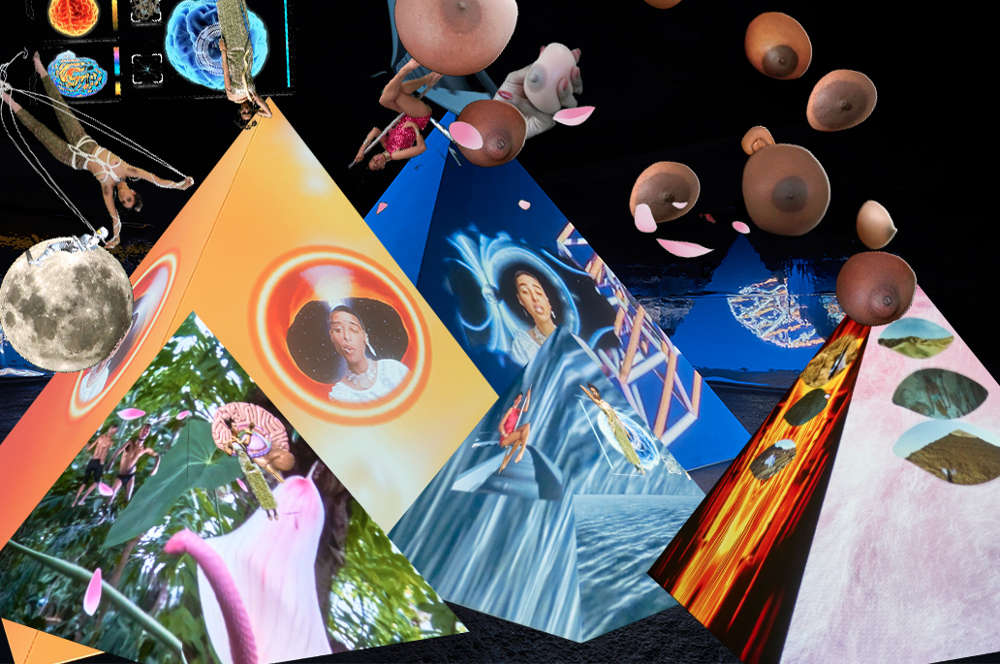Untranslatable Kriol
Reading 14.01.2019 19:00
With Odete Semedo and Filipa César
Languages Portuguese with translation into English
ENTRY Free – Donations welcome
The hurricane does not roar in pentameters
With reference to the old Italian warning "Traduttore, traditore", Teresa Montenegro reminds us that "to translate is to betray" in her text "Creole Proverbs: The Architecture of Images". In the framework of ECOLOGIES OF DARKNESS. BUILDING GROUNDS ON SHIFTING SANDS, this reading and conversation with Odete Semedo will delve into the imaginary of Guinea Bissau’s Creole, an oral language never to be detached from the historical, political and cultural condition from which it emerged, it is in a permanent state of recreation. Freed from the restraints of a systemised grammar and the fixed lexicon of written language, Creole is an untameable, ever growing communication rhizome. Poet Odete Semedo will exercise the untranslatability and opacity of the unofficial language spoken by more than 80% of the Guinean population. Inscribed with poetry and violence Kriol is the illegitimate child of the encounters between various cultures and subjectivities and adopted and disseminated by the Liberation Struggle.
Maria Odete da Costa Soares Semedo is a writer and literary theorist. She is a Senior Researcher at the National Institute of Studies and Research (INEP) Guinea-Bissau where she coordinates the KEBUR II Literary Collection and the Words of Women Series – a biographical study of women. She is also Professor at Amílcar Cabral University Guinea-Bissau. As a writer she works both in Portuguese and Guinea Creole and is the founder of the journal Revista de Letras, Artes e Cultura Tcholona, and has published two books of poetry, "Entre o Ser e o Amar" (1996) and "No Fundo do Canto" (2007). She has served as Minister of Health, Minister of National Education, President of the National Commission of UNESCO-Guinea-Bissau and Rector of Amílcar Cabral University.
Filipa César is an artist and filmmaker interested in the porous borders between cinema, its reception, and the politics and poetics inherent to moving image. Her artistic practice takes media as a means to expand or expose counter narratives of resistance to Western epistemologies. Since 2011, César has been affected by the militant cinema from Guinea-Bissau as part of the African Liberation Movement and its imaginaries and cognitive potencies. Between 2011 and 2015, she was a participant of the research projects Living Archive and Visionary Archive, both organized by the Arsenal – Institute for Film and Video Art, Berlin. Her work has been screened and exhibited worldwide at festivals and art institutions, including Oberhausen, Curtas, Forum Expanded, Berlinale, IFFR, DocLisboa, Cinéma du Réel. SAAVY Contemporary, Khiasma, Tensta konsthall, Mumok, Contour 8 Biennial, Gasworks, Flaherty Seminar, MoMA, Harvard Art Museums, BIM.
Recommended Reading
Odete Semedo: As Mandjuandadi - Cantigas De Mulher Na Guiné-Bissau: Da Tradição Oral À Literatura, Belo Horizonte, 2010.
Odete Semedo: Panos de pente, Tradição, Canto e Poesia: Simbolismo e Lugar da Memória Coletiva Guineense
Teresa Montenegro: PROVÉRBIOS CRIOULOS: A ARQUITECTURA DAS IMAGENS Comunicação apresentada ao Colóquio Internacional Bolama, Caminho Longe, realizado no INEP de 23 a 26 de Novembro de 1990. (Soronda 18, Julho 1994, pp. 39-76)
Filipa César: A Grin Without Marker, in: Decolonizing Archives. Edited by L'Internationale Online with Rado Ištok 2016, p. 67-72.
Thanks We are grateful to Haus der Kulturen der Welt for bringing Odete Semedo to Berlin in the framework of the project The New Alphabet (Opening Days: 10.01.–13.01.2019).

